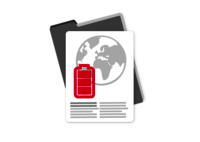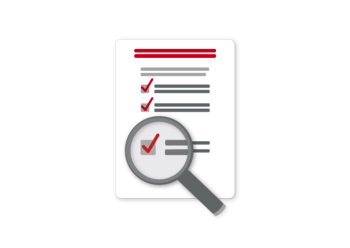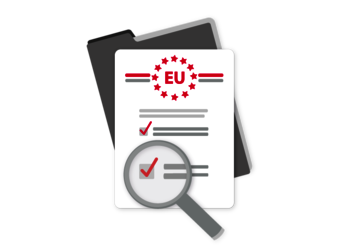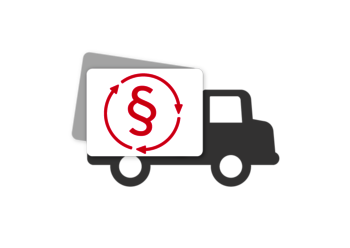Mandatory for almost every product: According to the GPSR, producers must draw up technical documentation for the products they place on the market. The technical documentation must be based on an internal risk analysis.
Since 16 July 2021, it is against the law to sell products with CE marking without a Responsible Person in the EU. In addition, a Responsible Person must also be specified in accordance with the General Product Safety Regulation (EU) 2023/988.

Find out which obligations the EU Batteries Regulation places on you and how to deal with them in your specific case. Receive comprehensive information on how to implement your obligations with regard to labelling, battery passport, EPR and due diligence obligations in the supply chain.
Find out which obligations the EU Batteries Regulation places on you and how to deal with them in your specific case. Receive comprehensive information on how to implement your obligations with regard to labelling, battery passport, EPR and due diligence obligations in the supply chain.
New Textile Labelling and Product Passport for Textiles?
A sustainable and circular strategy for textiles starts with the production and usage of textiles
A sustainable and circular textile strategy starts with the production and consumption of textiles. The EU's action programme, commonly referred to as the as textile strategy, has its origins in the European Green Deal, the Circular Economy Action Plan and the Industrial Strategy. In terms of content, the textile strategy includes binding EU-wide regulations on eco-design, textile labelling and extended producer responsibility for textiles and is reflected in the planned amendment to the EU Waste Framework Directive.
The negative impact of fast-moving and hardly recyclable textiles on the environment is immense, which is why the EU Commission sees a strong need for regulation to counteract the "fast fashion trend". EU regulations for textiles are being strengthened in order to promote a switch to more sustainable products and reduce the environmental impact.
The vision of the EU textile strategy is to make all textile products within the EU durable and recyclable by 2030. Products should consist primarily of recycled fibres and be free from hazardous substances. The aim is for the manufacture of textiles to be subject to strict guidelines on compliance with social rights in order to ensure sustainable and social production.
Similar to electrical appliances, batteries and packaging, extended producer responsibility (EPR) is also to be formulated for textiles. Producers are to be obliged to bear the costs of managing textile waste and fulfil a transparency obligation for unsold goods. From 2025, all EU member states will be expected to collect textiles separately in order to support the transition to more sustainable textiles. Here, too, producers are expected to contribute financially to creating capacities for collection, sorting, reuse and recycling. The level of payments made by producers to the EPR system will be adjusted based on the environmental performance of the textiles, a principle known as "eco-modulation".
The strategy also supports research into innovative technologies for the textile industry, including the promising fibre-to-fibre recycling, as part of efforts to tackle fast fashion and textile waste.
The next steps: after the European Commission proposed rules in July 2023 to make producers responsible for the entire life cycle of textile products and to support the sustainable management of textile waste in the EU, this Commission proposal is currently being scrutinised by the European Parliament and the Council as part of an ordinary legislative procedure.
Both take-e-way GmbH and trade-e-bility GmbH will follow the legislative process closely and develop customised solutions for producers, importers and retailers to facilitate the transition to more sustainable textiles and ensure compliance with EU regulations. In addition, we already offer a wide range of services relating to textile products (clothing, furniture, mattresses, toys, etc.), including:



